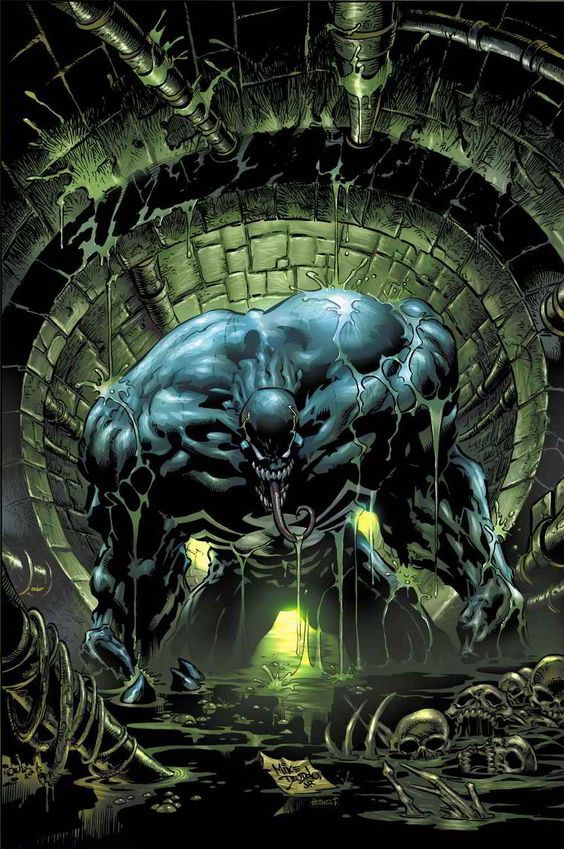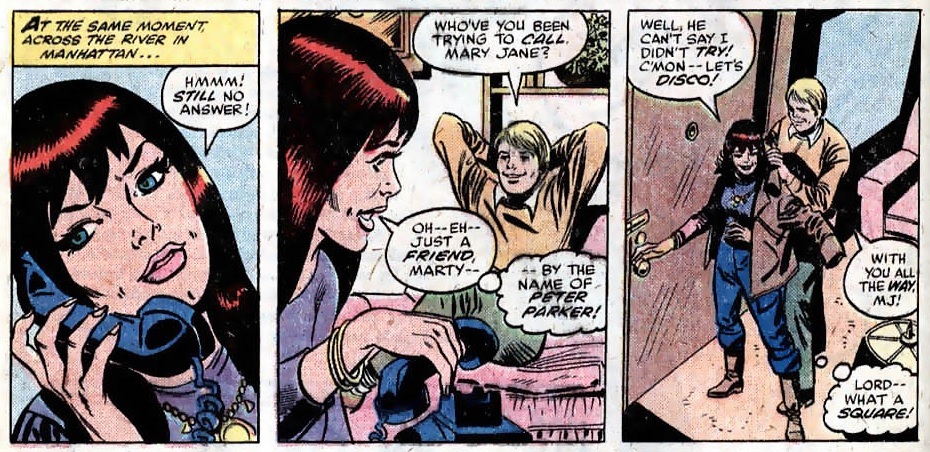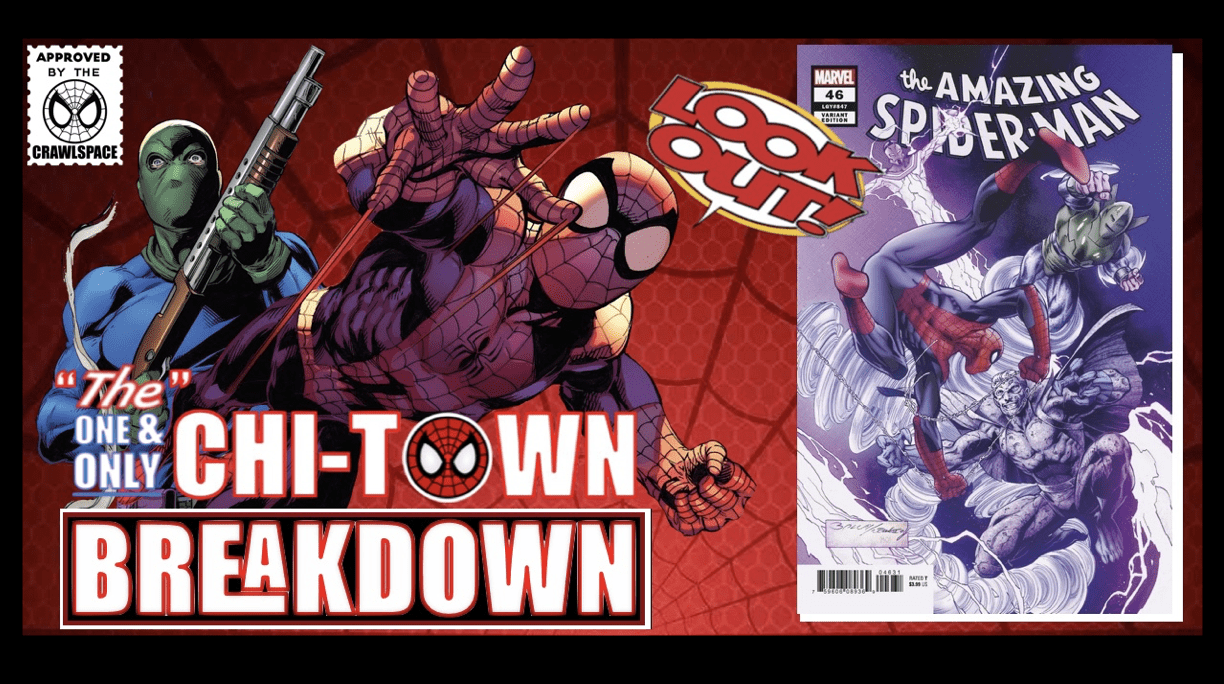Last time we talked about Eddie Brock’s psychology. However to truly understand his character there is much more about Brock’s mental state to examine.

As in previous parts we are continuing to examine this criticism of ASM #300 outlined back in Part 1
- Eddie Brock’s motivations for hating Spider-Man are weak and make no sense
Please refresh your memories of Brock’s four page exposition dump about his back story from the issue as well as I will be referring to it quite a bit.
Plummeting Prospects and Poisonous Professions
Last time we established that Brock is a delusional psychotic. However whether you believe Brock was always delusional or that his delusions began upon the loss of his career, it wasn’t as though he was always just one step removed from being the killer we meet in ASM #300.
Indeed, it is entirely possible to argue that Brock was not truly mentally unstable at the time that he began blaming Spider-Man for his job loss, merely that he was in denial over it being his fault.* However whether you believe that or not there is no doubt that he was clearly mentally unstable and truly delusional by the time the symbiote first encountered him.
At that point Brock had come to be in that disturbed state not so much because of his job loss in and of itself, but from the life he’d endured in the aftermath. That is what truly drove him into the depths of depravity and cemented his delusions along with a burning hatred of Spider-Man.
For starters Brock’s life fell apart, which would already put a massive strain on anyone’s mind. This would be an especially big blow if we believe that he really did have a prestigious career as he claimed and faced accusations regarding his ethics. However to merely survive Brock had to (in his eyes) demean himself by writing trite articles about trivial matters such as celebrity scandals. Transitioning to the latter after being a respected journalist at a major metropolitan newspaper would have a negative effect upon most people. It would deliver a serious blow to their egos, self-esteems and general mental stabilities.
You could also argue that long-term exposure to such seedy material might’ve have poisoned (if you’ll pardon the pun) Brock in regards to his mental health. This is actually not an uncommon phenomenon. Long term or frequent exposure to a lot of negative material can do real damage to basically anyone’s mental health. Police officers and soldiers provide good examples of this as many of them are mentally affected by the horrific violence their jobs frequently expose them to.**
Brock even touches on this notion during his account of his past when he says:
And the garbage I was forced to write began to rot my soul.
In fact it is at least partially the reason he named himself Venom.
You may call me Venom for that is what I’m paid to spew out these days!
Isolation and Reinforcement
Not helping matters was the apparent isolation Brock experienced.
I don’t just mean being shunned by his colleagues; or as we later find out, by his ex-wife and father. Looking at the flashback images in ASM #300 they paint a picture of Brock as truly having no one in his life. No friends, no other colleagues, nobody; or at least nobody he’d have any kind of comforting connection to.
The impression given is that he was just by himself doing little except furiously exercising, writing mean spirited drivel, and ruminating upon his misfortunes and the causes of them; all of which is obviously unhealthy.
When in such a dark place in his life and surrounded by little but ‘venomous’ articles and his own frustrated and tormented thoughts (many of which focused upon hating Spider-Man) Brock’s mind likely magnified his negative feelings.
In doing so he reinforced his beliefs and by extension exacerbated the mental instability he was suffering from; almost like a psychological echo chamber. In real life psychology this is referred to as ‘negative reinforcement’, although the things it is positively reinforcing are negative thoughts and behaviours.
This is likely the reason that (as mentioned in the story) all of Brock’s exercise didn’t relieve his stress. And given just how muscular he was, Brock had obviously been doing a lot of exercise, giving us an indication of just how incredibly stressed, frustrated and otherwise negative he was.
Indeed the degree to which Brock exercised, the way he described violently hurting Spider-Man during it and the wall of news clippings about Spidey he looked at whilst working out speaks to someone with an obviously unhealthy obsession. Brock again admitted as much about this when he said the clippings ‘fed his hatred’, as much a constant reminder of his ruined career as his seething hatred for Spider-Man.
Essentially Brock was in a vicious cycle that simultaneously made him ever more mentally unstable and reinforced his irrational delusions about himself and his hatred for the Wall-Crawler. Add on a Catholic upbringing that seems to have provided a problematic way for Brock to contextualize the world and you have a recipe for disaster.
And at first that disaster took the form of Brock seriously considering suicide, which truly speaks to how mentally fragile he really was at the point where he encountered the symbiote.
Is it honestly any wonder that someone under these conditions might irrationally blame someone else for their misfortunes and then fan the flame of that blame into an obsessive hatred?
Comparative Considerations
I’ll go a step further. Does this truly make for such a ‘weak’ motivation from a creative point of view?
There are other cases (real and fictional) that echo Brock’s actions, at least as far as his irrational delusions and scapegoating blame are concerned.
Using some examples closer to home, both Emil Gregg and Stan Carter present cases of delusional and mentally unstable individuals.
From a sane and rational point of view anyone looking at either character must ask why precisely Gregg would ever believe himself to be a mass murderer when he has no evidence of that beyond hearing plans for some attacks that eventually took place.
And in Carter’s case why would he think it was a good idea to kill people merely because they were ‘soft on crime’, especially when he was himself a police officer and could probably be tougher on crime himself in various ways?
Well to my recollection in Gregg’s case we are never given an explanation and are left to presume that ‘he was just crazy’, with no specific mental condition ever given. In Carter’s case a potential explanation provided is that he was also mentally ill due to experimental drugs, the death of his partner on the police force pushed him over the edge.


In fact at one point during the Death of Jean DeWolff arc, the story goes out of its way to point out how Sin Eater is a ‘religious lunatic’. It presents Carter himself outright stating that his rationale for killing only makes sense to himself. He does this whilst confessing to a Priest, claiming his actions have religious righteousness behind them. Then he kills said priest, which one would imagine is at least a little hypocritical of him.


Retroactively the same came be said of Carter’s murder of Jean DeWolff herself. In a sequel story called ‘the Return of Sin Eater’, Peter David (author of the original story) had Carter claim that he and Jean were lovers.

It is arguable that this was a claim born of Carter’s disturbed mind. However if taken at face value Carter’s decision to kill someone he cared about (maybe even loved) seems rather confusing from a rational point of view.
Additionally Gregg was on some level aware that the priest in question was a target for murder and admitted he tried to warn him but did so in a vague, indirect way, claiming he couldn’t bring himself to confess. Isn’t this arguably just a little illogical on his part?
En masse readers of the time and later years have accepted Gregg and Carter’s motivations as perfectly valid for their actions. Indeed the story that both characters were vital parts of, ‘The Death of Jean DeWolff’, has been widely acclaimed since its publication in the mid-1980s.
Yet despite both of them being directly referenced in Venom’s origin, Eddie Brock similarly being mentally unstable and that instability being inherently linked to his hatred of Spidey, Venom’s origin and motives are regarded as an creatively weak. Which doesn’t make a lot of sense and being blunt smacks of more than a little hypocrisy?
In fact there are villains a plenty in superhero fiction who, like Brock, take up a vendetta against people for reasons which boil down to their personal issues (which can include mental instability) and/or because they just want someone to blame their misfortunes on. Readers similarly tend to have few problems with most of these characters.
Perhaps the prime examples from the Spider-Man franchise are J. Jonah Jameson, Harry Osborn and Norman Osborn, all generally popular and accepted characters within the fandom.
Jameson of course hinges a lot of his career and reputation on the ruination, capture or sometimes even death of Spider-Man to the point of where it is patently irrational.
To make matters worse since Jonah’s debut in 1963 there has never even been a singular definitive answer to why he feels the way he feels. Proposed answers have varied significantly but at most all boil down to Jonah ‘having serious issues’. And yet none of these answers make Jonah’s actions any less irrational or unreasonable, particularly when he has literally created super villains and broken numerous other laws in pursuit of his vendetta.
It is curious how readers accept one person with a flattop haircut having a seething and irrational hatred for Spider-Man but not another one. Especially when in Brock’s case he was so over the edge that he wanted to violently murder the wall-crawler and considered suicide? Frankly Brock’s actions are comparatively more believable given what we know about him.
Moving on we have the iconic Osborns. Harry Osborn of course was a drug addict in his youth, but as we later found out was also in serious denial (and possibly even delusional) about the nature of his upbringing. Whilst he’d believed for years that he and his father had a friendly relationship flashbacks and later stories revealed that to not be the case. Norman Osborn was at times distant and at other times critical as well as physically and emotionally abusive.



In the iconic Amazing Spider-Man #122 Harry witnessed the ‘final’ battle between Spider-Man and his father Norman Osborn/the Green Goblin, wherein the latter tried to impale Spidey in the back with a glider. Of course Spider-Man dodged thanks to his Spider Sense and Norman was seemingly killed instead.
However despite witnessing this scene (and being aware of his father’s murder of his friend Gwen Stacy) Harry unabashedly blamed Spider-Man for his father’s death. Initially the story culminated in Harry being taken to a mental institution and despite recovering, in later life he relapsed and was clearly mentally unstable.


As far In Norman Osborn is concerned he was explicitly implied to be insane in ASM #40.


Later in ASM #121 Norman blames Harry’s drug problems not on Harry himself, nor on his own failure as a father, but on Harry’s friends, especially Peter.



In the 1990s one shot ‘The Osborn Journal’ Norman does something similar. Not only does he blame Mary Jane for Harry’s drug problems, but he also blames Peter for driving Harry to his death. Harry had used a new version of the strength enhancing Goblin formula that proved toxic to his system. Norman was fully aware of these facts and yet instead of attributing blame to himself or Harry he blamed Peter Parker.


In both cases we have clearly mentally unhinged individuals who are blaming Peter Parker for bad things in their life which rationally he is not at fault for.***
I’ve yet to encounter anyone who finds these motivations for either Osborn illogical or examples of poor writing. But despite Venom being far from dissimilar to either character many readers still hold him in contempt on both counts.
To be fair their problems with the character (and issue as a whole) might lie less with recognizing Brock’s mental instability and more with his seemingly flimsy reasons for targeting Spider-Man specifically.
That’s okay though, because that’s the subject of the next instalment.
*I find this very unlikely personally. I think Brock was delusional to some degree when he lost his job and just got worse. Nevertheless denial can be a powerful thing even if you are not otherwise mentally ill.
**This is partially why alcoholism and other substance abuses can be prevalence among the police officers and soldiers.
***I admit that Norman and Harry Osborn’s vendettas against Spider-Man began in the 1960s and 1970s when writing standards for comics were not what they were by the time ASM #300 was published in 1988. However both characters had revivals as villains in the 1990s and those old vendettas were revisited and expanded but never retconned into something drastically different. Fundamentally the characters retained their old irrational motivations.
P.S. The symbiote’s interactions with Brock and it’s unnatural presence as a part of his mind and body probably wasn’t going to help his state of mind given how vulnerable he was at that point in time.









